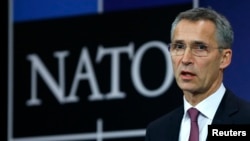NATO’s new secretary general says increased tensions with Russia and military activity on both sides could “spiral out of control,” and he called on Russia to take steps to end the crisis. At a meeting in Brussels, Jens Stoltenberg also said he expects the situation, sparked by Russia’s annexation of Crimea and involvement in eastern Ukraine, to continue for a long time.
At a meeting of NATO foreign ministers, the secretary general said Russia’s actions in Ukraine have “serious implications” for security throughout Europe and North America.
He said the moves, along with Russia’s build-up of troops along its western border and increased air patrols in the direction of NATO, have caused the alliance to increase its troop presence and exercise tempo in its eastern regions, putting two powerful and increasingly hostile military forces in close proximity.
“That situation with more military persons on the borders, with more snap exercises, with more military activity in the airspace around the NATO borders, increases the danger for accidents, for misunderstandings, that the situation can spiral out of control,” said Stoltenberg.
On Tuesday, the NATO foreign ministers approved creation of a “Spearhead Force” to be ready to respond quickly to any threats to NATO members. The small force is to be enhanced in 2016.
That is part of a broader effort to strengthen the alliance’s capabilities. U.S. Secretary of State John Kerry called on all members to do their part.
“Every ally has to pull their weight, and that was part of my message today. We can’t have 21st century security on the cheap. All nations, all members of the alliance, need to be increasing their capacity to be able to meet the challenges that we face today,” said Kerry.
'Spearhead Force'
At their meeting Tuesday, the NATO foreign ministers approved creation of a “Spearhead Force” to be ready to respond quickly to any threats to NATO members. The small force is to be enhanced in 2016.
Stoltenberg called on Russia to live up to its obligations under international law, to stop what he called the “deliberate destabilization” of Ukraine through its support for separatists in two eastern regions, and to abide by the Minsk agreement designed to help resolve the conflict. But he also made clear he does not expect that situation, or the status of Crimea, to be resolved anytime soon.
“I think that we have to be prepared that this can last for a long time, and that the changes we have seen in Europe may be something which will not go back to normal within a short period,” said he.
Economic sanctions
Stoltenberg welcomed economic sanctions imposed on Russia by all NATO member states, saying there must be consequences for violating the rules that have kept Europe at peace since World War II.
The foreign ministers declared that four promised trust funds are now operating to provide help for Ukraine on military logistics, command and control, cyber defense and retraining former soldiers. They also announced a new fund to help rehabilitate wounded troops.
Stoltenberg said NATO’s small advisory mission in Kyiv will continue to grow.
Ukraine’s new government has said it wants to move toward NATO membership, and Stoltenberg said if that becomes Ukrainian policy, the alliance would process the application. The process of joining NATO usually takes several years and depends on the strength of each country’s military forces and democratic institutions, as well as a variety of other criteria.




